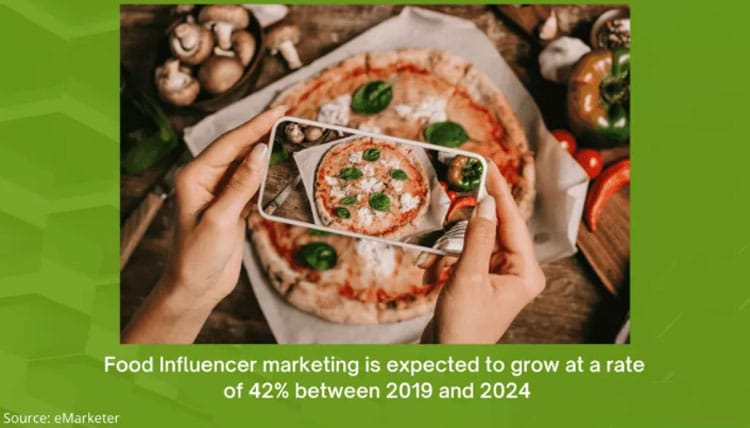How to use food bloggers in food promotion: strategies and pitfalls

This article explores the important role that food bloggers play in modern food advertising. It provides readers with an understanding of the importance of cooperation with these culinary experts and analyzes successful strategies of brand-creator interaction. At the same time, the author draws attention to the pitfalls that can arise when using food bloggers and offers tips for avoiding them.
The role of food bloggers in modern food advertising
Online food bloggers play a significant role in modern food advertising. Their influence and credibility in the world of online communities allows for lucrative opportunities to promote brands and products. Culinary bloggers usually have a large and loyal audience that trusts them for nutrition and gastronomy. When a blogger recommends a product, their subscribers tend to take that advice as a personal recommendation, which creates a powerful promotional mechanism.
eMarketer predicts that food influencer marketing will grow 42% between 2019 and 2024.

This growth is due to several factors, including the popularity of social media and an increase in the number of food-centric influencers. According to the Food and Health Survey from the International Food Information Council, 43% of respondents use the internet to find information about food, meals and recipes. As a result, more brands are showing interest in engaging consumers through these channels.

Food related bloggers specialize in creating visually appealing photos and videos. Such content is ideal for promoting food products, as it allows potential customers to see the product in action. Colorful and appetizing images spur interest and the desire to try the product. Plus, authors of such blogs keep up with the latest trends in the world of food and cooking. This means that they can help brands promote new products or demonstrate how to use a product according to today’s taste requirements. Such information is valuable for companies looking to stay relevant in the food market.
Strategies for utilizing food bloggers
Finding the right food blogger to partner with is a critical step in advertising strategy. The right choice will help maximize campaign effectiveness and achieve campaign goals. To do this, it is important to understand what objectives are planned to be achieved through collaboration – it may be to increase brand awareness, increase sales of a particular product or attract a new audience. Next, it is necessary to conduct a study of blogs and social media to identify the range of personalities who are most active and in demand in the necessary niche. At this stage, you need to find out what products and cooking styles they discuss, how they interact with their audience, how often they post content and what level of engagement (likes, comments) they receive on posts. Popular and influential bloggers tend to have larger audiences, but also cost more.
There are several main options for brands to collaborate with food bloggers:
- Cash payment: the blogger gets paid for placing ads for the product on their platform. This method is the most common, especially among well-known creators.
- Free product samples: The brand provides the food blogger with their products for evaluation and review. This helps the blogger to familiarize himself with the product and convey his impressions to the audience.
- Joint events: The blogger and the brand can organize joint events such as cooking shows, contests or giveaways to engage the audience.
It is important to remember that collaborating for mutual benefit should be fair and agreed upon by both parties. Each participant should benefit from this partnership, and only then it will be really successful and productive. At the same time, it is desirable to emphasize the establishment of long-term relationships. This approach fosters a strong and trusting relationship between the brand and the blogger, which leads to more authentic and effective advertising campaigns. Plus, long-term contacts allow the brand to follow the blogger’s development and participate in their career growth, which can ultimately benefit both parties.

The pitfalls of using food bloggers in food promotion
Any promotional strategy has both advantages and disadvantages. Using food bloggers is no exception. Let’s take a look at the common traps that brand owners who promote their product in this way can fall into.
- Fake advertising is ineffective: When food bloggers start to look like paid actors rather than natural product connoisseurs, audiences are quick to notice. A message that doesn’t come from the blogger’s sincere belief in the quality of the product can not only be off-putting, but will also cause a negative reaction from subscribers. A food blogger’s authenticity and honesty about the product should come first.
- Perception of the blogger as a paid advertisement: To avoid the perception of the blogger as someone selling something solely for money, the product should be integrated naturally into the content. To do this, instruct the content creator on how to better incorporate the product into their content strategy and create a sincere review.
- Ignoring the audience: One of the most critical mistakes when collaborating with food bloggers is ignoring the interests and preferences of their audience. With a crier, it is unique, and advertising should be tailored to those characteristics. That’s why a brand should thoroughly research the specifics of the blogger’s subscribers before starting a partnership. Understanding what exactly they are interested in and what products they prefer will help to create advertising content that will be natural and attractive to the target audience. For example, you should not advertise vegan dishes in a publisher that offers recipes for meat dishes. If the product does not match the interests of the audience, it can cause the most negative comments and reactions.
- Ad overload: Excessive advertising on a blogger’s page can lead to audience pushback and decreased engagement. Subscribers initially go for content that is interesting to them personally, and too many ads can upset that balance. To avoid this trap, bloggers should use a variety of formats and creative ideas to present a product. This can include recipes, themed flash mobs, or stories about the creation of the product. The key is to keep subscribers interested and provide them with a variety of content.
- Non-compliance with legislation: Before collaborating, brands should familiarize themselves with the legal requirements for social media advertising in their respective region. This may include mandating the labeling of promotional content, using hashtags that indicate advertising (#ad or #sponsored), and being transparent about the financial agreements between the blogger and the brand. For example, some countries have specific rules regarding food advertising or ingredient labeling requirements. Ignoring these requirements leads to legal consequences.
Thus, the use of food bloggers in food advertising campaigns can be a powerful promotional tool, but comes with a number of pitfalls. To avoid problems, brands must ensure authenticity, consider the interests of the blogger’s audience, avoid ad overload and strictly comply with legislation. Only then will collaboration with food bloggers be effective and long-lasting.
Have you read?
The 21st Century’s Biggest Financial Frauds and Controversies.
The World’s Most Valuable Unicorns, 2023.
The World’s Top 10 Highest-Paid Wealth Management Executives.
Highest paid chief executive officers in the United States in 2022.
Highly-Paid Entertainment Chief Executives.
Highest paid health insurance CEOs.
Bring the best of the CEOWORLD magazine's global journalism to audiences in the United States and around the world. - Add CEOWORLD magazine to your Google News feed.
Follow CEOWORLD magazine headlines on: Google News, LinkedIn, Twitter, and Facebook.
Copyright 2025 The CEOWORLD magazine. All rights reserved. This material (and any extract from it) must not be copied, redistributed or placed on any website, without CEOWORLD magazine' prior written consent. For media queries, please contact: info@ceoworld.biz








